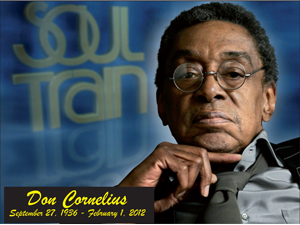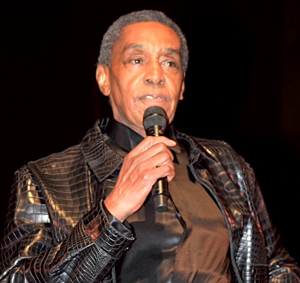
(FinalCall.com) – For decades, millions of televisions were tuned in for folks to catch a glimpse of what was more than just an entertainment show–it was a display of Black cultural expression and talent, Soul Train.
The impact and influence of its creator and host Don Cornelius, with his suave, cool demeanor and smooth deep voice, made Soul Train a necessary staple for those wanting a peek into the latest dance moves and fashion or to watch their favorite artists perform. But Don Cornelius and Soul Train were more than just entertainment.
The life and legacy of Mr. Cornelius left an indelible imprint on legions of people mourning his loss as a visionary who moved Black music into previously uncharted territory of national television exposure. Artists that might not have otherwise been seen owe a debt of gratitude to Mr. Cornelius, who was instrumental in opening those doors.
The man whose signature phrase was “love, peace and soul,” and who hosted the show from 1970 to 1993, was found dead Feb. 1 at his home in Sherman Oaks, Calif., of an apparent self-inflicted gunshot wound to the head. He was 75.
A Chicago native, Mr. Cornelius got his start in communications by broadcasting and covering the news at WVON-AM, the oldest Black-owned radio station in the city. His influence on current radio personalities at the station is still felt.
Matt McGill, host of WVON’s morning show, compared Mr. Cornelius to John Johnson, the iconic founder of Ebony and Jet magazines telling The Final Call the Cornelius legacy is not just being instrumental in propelling Black music talent but also allowing everyday Black people an opportunity to see themselves.
“More importantly it was the people that were on Soul Train dancing. It was everyday, average people who are just like us that we tuned in to see. The celebrities of course we wanted to see the Marvin Gaye’s, the Jackson 5, everybody in between …we wanted to see them,” said Mr. McGill.
“I think though the real story is how this brother carved out a career for himself and not just an ordinary career but an extraordinary career because we’re talking about it right now. How do you go from being a Chicago police officer to making it in this country in television production at the highest level, I mean that’s the real story with Don,” continued Mr. McGill.
Mr. Cornelius funded the pilot for Soul Train with $400 of his own money. One of the men he pitched his idea to was George O’Hare, who at the time was a sales and promotion manager at Sears. As a volunteer for Dr. Martin Luther King Jr., Mr. O’Hare had driven Dr. King to the WVON studio when he first met Mr. Cornelius in the late 1960s.
Mr. O’Hare said when he told the budding entrepreneur he was in advertising, Mr. Cornelius immediately asked him out for drinks and pitched his idea.
“He talked about his dream in life … his dream was not like Dr. King’s. His dream was to have a T.V. show and be a star on a show. And I said well Don Cornelius let me tell you, I said there’s nobody Black with a T.V. show and I don’t know how you’re going to do it,” Mr. O’Hare told The Final Call in a telephone interview.
Mr. O’Hare said when one of his clients approached him about advertising something in “soul,” he had no idea what that was. Mr. O’Hare, a Caucasian, said he called Mr. Cornelius for an explanation. When it was explained, the 1970 pilot for the show began. That is how the first ad revenue was generated for the show, explained Mr. O’Hare.
“Then I got calls from all over the country because the store managers, when they would see people coming in the store the (customers) would say, ‘I saw this on Soul Train’ and it got so big that they (advertisers) all started having their merchandise managers for appliances in different cities all over the country calling me to get the phone number to get on Soul Train,” said Mr. O’Hare.
Mr. O’Hare said then George Johnson, Black businessman and owner of Johnson Products, contacted him about advertising on the show to take the program national. With this development the creator of brands such as Soft Sheen hair products came together with a soon-to-be brother and Black business giants, a rarity for the time. In 1971 Johnson Products became the only Black advertiser to sponsor a nationally syndicated show, Soul Train.
“That’s when it broke all over the county and Soul Train became one of the greatest hits that we ever had as far as sales are concerned,” said Mr. O’Hare.

A facet to the legacy of Mr. Cornelius that is often overlooked is his journalism background he incorporated into Soul Train. Musicians are often relegated to performing but Mr. Cornelius would ask substantive questions, allowing artists to share their views and opinions.
“He not only had musicians playing their music on his show, performing on his show, but he also gave wonderful interviews which gave the audience a chance to see behind the music,” said columnist and hip hop activist Truth Minista Paul Scott.
This type of penetrating look into artistry is missing today Mr. Scott told The Final Call.
“Any time you let people articulate questions in regards to the motivation behind their music, I think that puts them in some kind of position where they have to justify their words. We don’t have that accountability right now,” said Mr. Scott.
“We don’t have a Don Cornelius to really ask the harder questions so right now we’re experiencing this dumb(ing) down of Black music.”
Artists, entertainers and other admirers took to social media sites express not only the personal impact of Mr. Cornelius’ legacy but his broader legacy.
Radio personality, journalist and activist Davy D took to Twitter and posted, “Don took chances and exposed various [m]usic genres within Black music. He made sure we knew we were bigger than the dreaded disco label.”
“Although many won’t admit it, [t]o me Don Cornelius & Soul Train was the foundation for MTV & other music outlets that initially (sic) dissed us,” he added.
Kangol Kid of legendary rap group UTFO has fond memories of performing on Soul Train in the 1980s. UTFO was the first rap group to perform an R&B ballad on the show.
“Soul Train was another form of schooling for me and Don Cornelius was the principal. It educated me to become the entertainer that I am today. The famous song ‘Roxanne Roxanne,’ I say ‘I can sing, rap and dance in just one show’ and Soul Train taught me how to do that,” he told The Final Call.
The fact Soul Train presented a range of artists from singers, dancers and hip-hop artists greatly influenced him, said Kangol Kid.
By having rap artists perform on Soul Train, Don Cornelius was just being true to form, continued Kangol Kid. “Anything that was entertaining our people he did embrace and when hip hop became that he absolutely did what he always did, ignored everything else, and catered to his people and he did it well,” he added. Mr. Cornelius always had a door open for artists that deserved exposure and recognition not previously received, said Kangol Kid.
The legacy of Mr. Cornelius and Soul Train was not just limited to the United States. In a Feb. 1 interview on Rev. Al Sharpton’s radio show, Grammy award winning artist James Mtume said in his travels throughout the world as an artist people all over were familiar with the show.
“I’m traveling all around the world and I’m seeing people talking about Soul Train. I’m in Sweden and they’re talking about Soul Train, ‘tell us about Soul Train.’ So the impact was international,” said Mr. Mtume.
Mr. Mtume also praised the business acumen of Mr. Cornelius. “Don Cornelius was a brilliant businessman. He made a move like that. I find it humorous you know sometimes when today we talk about how difficult it is to do this or that. This brother pulled this off, way back then, 1971 I think was the first show and he did it with his own money,” said Mr. Mtume.
“Don Cornelius was a pioneer & a trailblazer. He was the first African-American to create, produce, host & more importantly OWN his own show,” NBA legend Ervin “Magic” Johnson posted also via Twitter. The former all-star and who is now a successful entrepreneur purchased Soul Train in 2011 and announced plans to bring the show back to television. It went off the air in 2006. “Soul Train taught the world how to dance! I thank him for trusting me with his Soul Train brand and I will carry on his legacy through it. Don’s contribution to us all is immeasurable,” added Mr. Johnson.
Mr. O’Hare said one of the things that stood out about Mr. Cornelius was an ability to “sell himself.” “I just realized that this guy is good. When you see something good, you know it’s good,” he said. Mr. O’Hare credits his friend with being an “example” in his life.
“Don was the personification in my opinion of one who knew what he wanted to do and said I’m going to do it and he did it.” said Mr. O’Hare. Don Cornelius was going after what was needed, he added.
Mr. Cornelius’ was an innovator and entrepreneur during a turbulent time in the history of America including the volatile 1960s civil rights movement and an era in which the Black presence on television was practically nonexistent. This makes the success of Mr. Cornelius all the more relevant today, argue some analysts.
There will always be a need for Black television shows and Black opinion in media, said Mr. McGill. “You can look at television today and compare it to television 20 years ago and it really doesn’t seem like there’s been a lot of progress made as far as Black producers and shows that depict real Black life. Soul Train was a reality show. That was Black reality,” he said.
“You look at television today and what we have that depicts African-Americans does not do that in a positive way,” said Mr. McGill. “When you look at where we are in the media today, Black representation in the media today, we are not better than we were 20 years ago and in some cases we’re not even putting out the way we did 20 years ago.”
“There’s always need for pioneers and people who are determined like Don Cornelius from our community to get out here and establish themselves the way that Don Cornelius did,” he said.












